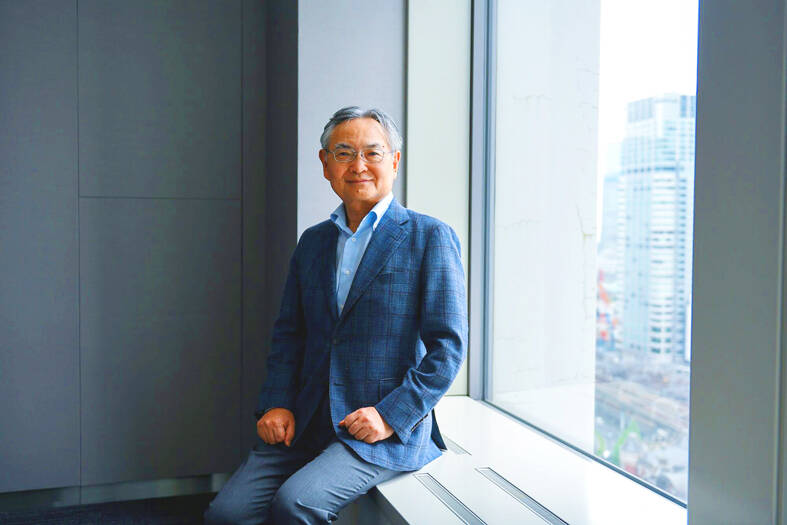Nikon Corp is fielding strong demand for its legacy chipmaking machines in China, which is mobilizing resources to build its own semiconductor supply chain.
Inquiries for the Japanese precision maker’s lithography tools have surged in China, Nikon president Muneaki Tokunari said.
The company is set to revamp a lithography machine geared for decades-old manufacturing processes. Its NSR-2205iL1, launching this summer, would serve the market for mature chip technology and Nikon expects to sell more than 10 units of the machine annually, said Tokunari, who is also chief operating officer and chief financial officer.

Photo: Bloomberg
New companies are sprouting up in China to make simpler semiconductors such as those that regulate power in vehicles, electronic devices and appliances. Behind that push are restrictions by the US and its allies, including Japan, on sales of cutting-edge equipment used to make advanced chips that enable artificial intelligence. Fewer restrictions are in place for well-established know-how.
“Our older machines are being used in China to make so-called legacy chips, and we are getting remarkable levels of inquiries for our new model,” Tokunari said in an interview, adding that the company’s tools are also available on the second-hand market.
Spurred by a countrywide effort to shore up its chip industry, China’s manufacturing capabilities are evolving at such a pace that “I wouldn’t be surprised if they are able to do quite a bit in five to 10 years,” he said.
Nikon used to rely heavily on Intel Corp for revenue, with the US firm accounting for 80 percent of semiconductor-related sales until a few years ago, he said, adding that now other companies comprise a majority of such sales, and the company is diversifying its client base in China, Taiwan and Japan.
However, headwinds exist. The US President Joe Biden’s administration has told Japan and the Netherlands that it is considering invoking the US’ foreign direct product rule if the two allies do not tighten export controls on chipmaking equipment further.
Restrictions on technology would likely become more strict, Tokunari said.
Nikon asks for export rules that are fair to all players in the market, he said.
Nikon is now making a strong marketing push in China with its new argon-fluoride lithography machines, released earlier this year in compliance with export controls, he said.
The Netherlands has restricted sales of industry leader ASML Holding NV’s extreme ultraviolet lithography machines used to make cutting-edge chips.
In the two years to March 2026, Nikon targets a 66 percent rise in operating profit to ¥25 billion (US$160 million) at its precision equipment segment, which includes lithography tools.
The company seeks to invest some of these profits to expand its customer base in areas such as digital manufacturing.
Nikon is fielding interest from defense and aerospace companies in the US for its metal 3D printers, Tokunari said.

Taiwan Semiconductor Manufacturing Co (TSMC, 台積電) last week recorded an increase in the number of shareholders to the highest in almost eight months, despite its share price falling 3.38 percent from the previous week, Taiwan Stock Exchange data released on Saturday showed. As of Friday, TSMC had 1.88 million shareholders, the most since the week of April 25 and an increase of 31,870 from the previous week, the data showed. The number of shareholders jumped despite a drop of NT$50 (US$1.59), or 3.38 percent, in TSMC’s share price from a week earlier to NT$1,430, as investors took profits from their earlier gains

In a high-security Shenzhen laboratory, Chinese scientists have built what Washington has spent years trying to prevent: a prototype of a machine capable of producing the cutting-edge semiconductor chips that power artificial intelligence (AI), smartphones and weapons central to Western military dominance, Reuters has learned. Completed early this year and undergoing testing, the prototype fills nearly an entire factory floor. It was built by a team of former engineers from Dutch semiconductor giant ASML who reverse-engineered the company’s extreme ultraviolet lithography (EUV) machines, according to two people with knowledge of the project. EUV machines sit at the heart of a technological Cold

AI TALENT: No financial details were released about the deal, in which top Groq executives, including its CEO, would join Nvidia to help advance the technology Nvidia Corp has agreed to a licensing deal with artificial intelligence (AI) start-up Groq, furthering its investments in companies connected to the AI boom and gaining the right to add a new type of technology to its products. The world’s largest publicly traded company has paid for the right to use Groq’s technology and is to integrate its chip design into future products. Some of the start-up’s executives are leaving to join Nvidia to help with that effort, the companies said. Groq would continue as an independent company with a new chief executive, it said on Wednesday in a post on its Web

CHINA RIVAL: The chips are positioned to compete with Nvidia’s Hopper and Blackwell products and would enable clusters connecting more than 100,000 chips Moore Threads Technology Co (摩爾線程) introduced a new generation of chips aimed at reducing artificial intelligence (AI) developers’ dependence on Nvidia Corp’s hardware, just weeks after pulling off one of the most successful Chinese initial public offerings (IPOs) in years. “These products will significantly enhance world-class computing speed and capabilities that all developers aspire to,” Moore Threads CEO Zhang Jianzhong (張建中), a former Nvidia executive, said on Saturday at a company event in Beijing. “We hope they can meet the needs of more developers in China so that you no longer need to wait for advanced foreign products.” Chinese chipmakers are in